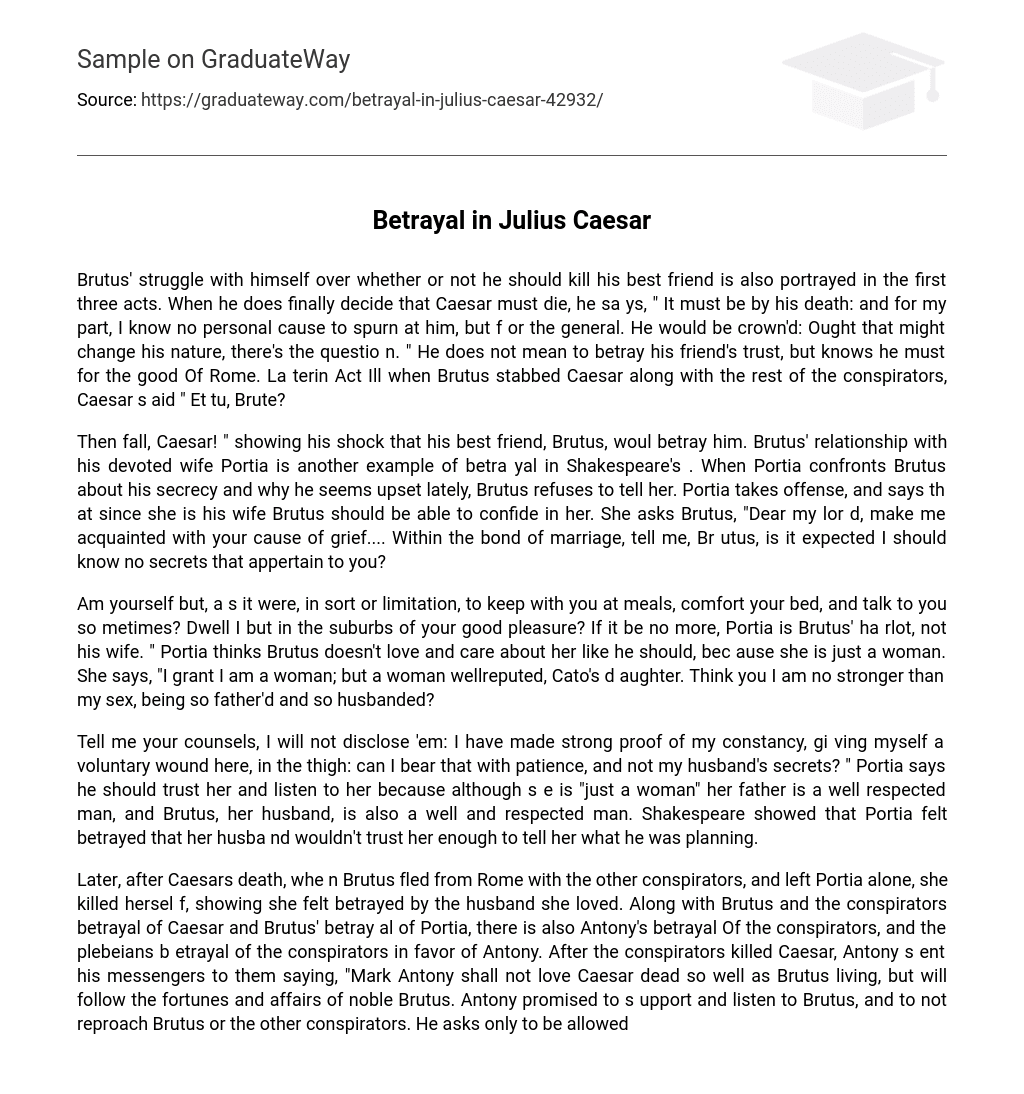The first three acts showcase Brutus’ internal struggle on whether or not to kill his closest friend. Eventually, he determines that Caesar must be slain, stating, “It must be by his death: and for my part, I know no personal cause to spurn at him, but for the general. He would be crown’d: Ought that might change his nature, there’s the question.” Despite not intending to betray his friend’s trust, Brutus understands it is necessary for the greater good of Rome. In Act III, when Brutus stabs Caesar alongside the other conspirators, Caesar utters the infamous words, “Et tu, Brute?”
Shakespeare’s depiction of betrayal in Caesar is exemplified by Brutus’ shocking betrayal of his best friend Caesar, as well as his betrayal of his devoted wife Portia. When Portia confronts Brutus about his recent secrecy and apparent unhappiness, he refuses to confide in her. Portia takes offense, insisting that as his wife, Brutus should trust her with his troubles. She pleads with him, saying, “Dear my lord, make me acquainted with your cause of grief…. Within the bond of marriage, tell me, Brutus, am I not expected to know all the secrets that concern you?”
Are you asking if I can be with you at mealtimes, comfort you in bed, and sometimes talk to you? Am I only allowed to be near you when it suits your pleasure? If that is the case, then Portia is nothing more than a prostitute to Brutus, not his wife. Portia believes that Brutus does not love and care for her as he should because she is a woman. She asserts, “I acknowledge that I am a woman; but I am a well-respected woman, the daughter of Cato. Do you think I am weaker than my gender suggests, given the strong father and husband I have?”
Portia insists that her husband should trust her and confide in her, as she promises to keep his secrets hidden. She reminds him that she has demonstrated her unwavering loyalty by inflicting a voluntary wound upon herself on her thigh. Portia questions whether she can endure such physical pain without complaining and yet not be entrusted with her husband’s secrets. She believes that her gender should not undermine her trustworthiness, as she is the daughter of a reputable man and the wife of a respected man. Shakespeare portrays Portia’s sense of betrayal and disappointment over being excluded from her husband’s plans.
Later, after Caesar’s death, when Brutus fled from Rome with the other conspirators, and left Portia alone, she took her own life, demonstrating her sense of betrayal by the husband she loved. In addition to the betrayal of Caesar by Brutus and the conspirators, there is also Antony’s betrayal of the conspirators and the plebeians’ betrayal of them in favor of Antony. After the conspirators killed Caesar, Antony sent his messengers to them, stating “Mark Antony shall not love Caesar dead so well as Brutus living, but will follow the fortunes and affairs of noble Brutus.” Antony promised to support and listen to Brutus, without reproaching him or the other conspirators. He only requested permission to bury Caesar, with a promise not to praise him. However, in his speech for Caesar, he ultimately betrays Brutus’s trust and turns the crowd against him and the other conspirators. In a way, the plebeians also betray Brutus because not long ago, during Brutus’s speech, they chanted “Live, Brutus! Live, live! Bring him with triumph home unto his house! Give him a statue with his ancestors! Let him be Caesar!”
Caesar’s better parts will be crowned in Brutus! We will bring him to his house with shouts and clamors. After Antony turned them against Brutus and the conspirators, however, the crowd sought to kill Brutus and the rest of the men, betraying the people they had just praised. This event portrayed in William Shakespeare’s tragic play contains the theme of betrayal. Betrayal is a common occurrence in real life and is also depicted in various popular movies, TV shows, and books that both teens and adults enjoy watching today, such as the movie Mean Girls, directed by Mark Waters.
Regina Blair, much like Julius Caesar, led her school and had followers, but her power also brought fear and hatred, eventually leading to her social demise. The same can be said for Julius Caesar, who ruled Rome alone and was hated and killed due to his feared authority. Shakespeare accurately captured the universal theme of betrayal in his play Julius Caesar, making it relatable to not only teens but also readers for centuries to come.





